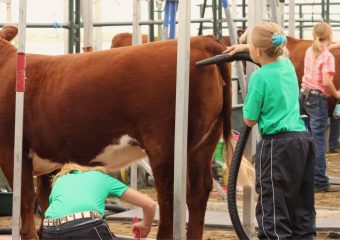7 Steps To A Successful Ag Event
Written by Diane Martin for MarketingToFarmers.com
Planning an event pays off in the engagement. We’ve planned and attended many events, from press conferences and industry seminars to award ceremonies and after-parties. When it comes to planning and hosting an event, your intentions and expectations are for it to go from start to finish without a hitch. And that says nothing about the crowd you hope will attend, the press coverage you would like before and after, and the networking you would like to achieve. The ag industry necessitates a seasonality for events, given the precious time farmers and ranchers are most occupied with their own operations throughout the year. For the short ag event seasons, we recommend these seven guidelines to prepare you for an organized planning process and lead you toward producing a successful event.
1. Establish defined marketing goals for the event
Exhibiting a new model of machinery, presenting trial results, or rolling out a new chemistry — these are a perfect reason to draw a crowd. Whatever the goal for your event, ensure that you recognize the purpose, how it meets your broader marketing objectives, and that you are able to communicate it to your audience
2. Set the Budget
We recommend that after you determine your goals, you also fine-tune the budget. For a successful event, you need to align every single decision from this point on with that dollar amount.
3. Time, date and location are paramount to having an event
Once you have secured a date that is appropriately timed and does not conflict with any other events, we suggest you connect with vendors, farmers, and ranchers with whom you have relationships
to explore using their facilities for your event. You will need to negotiate spaces with rooms that can accommodate large groups, physical demonstrations, and media connectivity for presenters, the press, and attendees. Always consider that the best ways to illustrate ag products and services are in their natural environments. As well, the expertise and opportunities that these facilities can offer are a complement to your event.
4. Find your speakers
To select speakers for a panel or obtain a subject-matter expert, Extension educators can be an excellent source of knowledge and expertise, as well as ag associations, government agencies, local businesses, and community members.
5. It’s all in the details
And there are a lot of them. What might seem like minutia – RSVPs, directions, parking, food, seating arrangements, and signage – are necessities to your attendees and you need to facilitate them. Wi-Fi and working technology are absolute essentials for functioning audio/visual presentations and networking. There are catering needs to be fulfilled at all times throughout the event. Finally, vendors and sponsors require space and opportunities to showcase their products and services, if you are relying on them to help finance your event.
6. Can we get your attention, please!
You must have promotions prior to and on the day of the event, in order to obtain attendees and sufficient media exposure. That requires coordination of interviews, media training and coverage and/or a potential press conference if the event is large enough. There should also be
social media leading up to and after the event, as well as opportunities for
live-Tweeting and
Facebook Live.
7. Saying thanks with ag swag
Saying thank you is a necessity to continue engagement and retain business. But in this competitive market and with today’s ease of online purchases, a simple thank you isn’t enough. We suggest you borrow a lesson from the swag bag – encouraging engagement via branded, value-added items to remind the consumer who you are and why your business is a necessity. The caveat is that we’re referring to items that are directly related to you as a business and will connect you to your audience. They need not be pricey, but they should identify you directly with your consumer. Make it more than trinkets, give them legitimate value, include your contact information and follow up with regular communication to establish a relationship. Events are more than an interactive way to network and bring ideas and information to life. They require an investment in time, personnel, creativity and funds to deliver an experience for customers. That experience is ultimately part of the customer journey and has the potential to positively influence relationships and sales.




